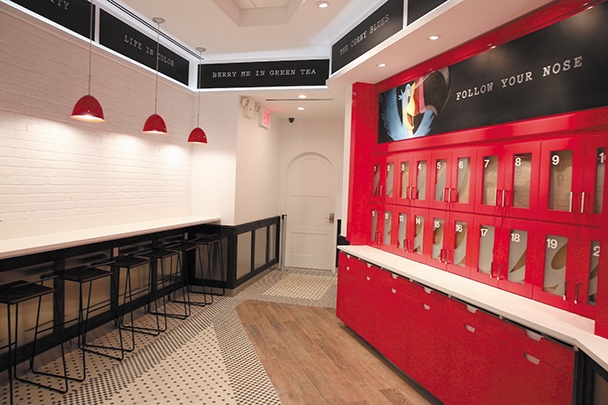Retail Report: Food Import Challenges, Kelloggs Cafe
by August 15, 2016 12:00 am 296 views

Kellogg’s Opens Cereal Café
In New York City
Kellogg’s has teamed up with a celebrated chef to open a cereal café in New York City’s Times Square.
Visitors to Kellogg’s NYC are treated to modern twists on cereal served in what is described as a retro atmosphere. But visitors won’t be eating snack-packs of cereal dumped into bowls by harried waitresses. Instead, Kellogg’s is kicking things up a notch with a chef-created menu of custom cereal creations that incorporates gourmet mix-ins as well as a choice of dairy.
“An order of ‘Life in Color’ includes a bowl of Froot Loops with lime zest, marshmallows and passion fruit jam. Order ‘Honey Buzz,’ and you’ll get a bowl of Honey Smacks with honey, toasted pecans and banana chips. Prefer ice cream? You can swap that for the milk.
Chef Christina Tosi, founder and owner of Momofuku Milk Bar in New York, helped develop the recipes.
Kellogg’s is not the first company to introduce the idea of a cereal café. Cereality began a national expansion in the early-to-mid-2000s, though there are only two locations operating today.
Will Kellogg’s NYC succeed? Possibly. The location, combined with the Kellogg’s name may attract customers. In addition, the café reinforces the Kellogg’s brand by encouraging patrons to enjoy cereal as a snack or light meal.
Cultural Differences Present
Food Import Challenges
In 2011, President Barack Obama signed the Food Safety Modernization Act into law.
The U.S. Food and Drug Administration touted the measure as a means to prevent contamination, rather than respond to it, but some suppliers and retailers are experiencing challenges when it comes to importing foods from other countries. One, perhaps surprising, barrier to food safety compliance is cultural differences in the way people from other countries understand “safe” preparation and processing of the food we eat.
In an article at Food Safety News about the recent International Association for Food Protection’s “global food safety kaleidoscope” panel, Dan Flynn notes some of these differences.
For instance, in some countries, fruits and vegetables are always cooked before eating, mitigating concerns about contaminated produce. Other countries may believe that food allergies and sensitivities are a “foreign” problem; still others may have different standards for assessing the freshness of food. For example, in China, consumers expect their freshly butchered pork to still be warm when placed for display at the market, while warm meat would be a red flag for Americans that something was wrong with the retailer’s refrigeration and storage processes.
Flynn reports that the panel discussed these cultural challenges but didn’t offer any easy solutions. Instead, participants discussed cultural differences and suggested ways of proactively addressing them, including checking assumptions and biases about how food safety “ought” to look:
“Newbies in international food safety aren’t going to make it if they carry cultural bias into their audits. Panelists said they should instead focus on science, risk management and networking to accomplish what they need to do,” according to the Food Safety News piece.
The take-away for suppliers and retailers? Make food safety compliance a priority, particularly if sourcing ingredients from other countries or outsourcing manufacture to places with radically different standards. Pay attention to current regulations and work to make sure that partners understand U.S. standards.
Walmart Helps Associates
Earn High School Diplomas
In 2014, Wal-Mart Stores Inc. made some sweeping changes in its human resource policies. Much of the public’s attention focused on Walmart’s decision to raise wages for its entry-level employees.
However, another element was an initiative to increase training and educational opportunities for store associates. While some of the training focused on professional development, Walmart offered another, more holistic option: Earning a high school diploma through the Career Online High School program.
“Cengage Learning and Smart Horizons Career Online Education created COHS in 2012 to deliver career-based online education opportunities to adults in the U.S. who don’t have a high school diploma. Since then, Walmart is one of many leading companies that have built out their strategies to upskill and retain employees by teaming up with higher education institutions to offer incentives deeper than traditional tuition reimbursement program offerings,” according to an article on Chief Learning Officer.
The COHS diploma option allows students to study online, and the program can be completed in as little as six months for students who have already completed some high school. For working adults, this kind of flexibility is often essential when trying to balance work and family responsibilities.
For Walmart, the decision to offer a high school diploma completion program makes sense. Walmart leadership has already indicated that it wants to help associates develop their careers. A high school diploma (or its equivalent) is often critical to job advancement and is a requirement for someone who wishes to pursue higher education. By investing in employee education, Walmart is helping to ensure that its best workers will be well-prepared to take on new roles within the company.
